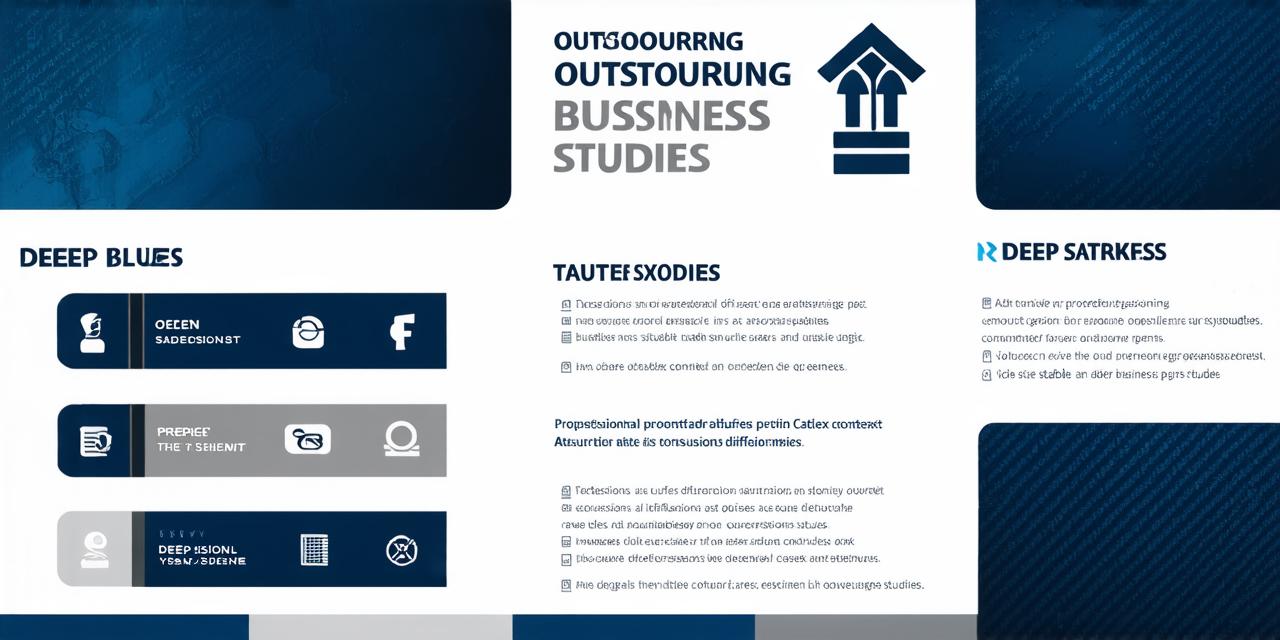Outsourcing is the process of obtaining goods or services from an external source rather than producing them internally. In the context of A-level Business Studies, outsourcing can be defined as a strategy used by businesses to outsource certain functions or activities to third-party providers in order to reduce costs, increase efficiency and focus on core competencies.
Benefits of Outsourcing in A-level Business Studies
There are several benefits to outsourcing in A-level Business Studies, including:

- Cost savings: By outsourcing certain functions or activities to third-party providers, businesses can reduce their overhead costs and free up resources for other areas of the business. This can lead to significant cost savings over time.
- Increased efficiency: Outsourcing can help businesses to focus on their core competencies, allowing them to improve their productivity and efficiency in key areas. This can lead to faster turnaround times, higher-quality products or services, and greater customer satisfaction.
- Access to specialized expertise: Third-party providers often have specialized expertise that may not be available internally. By outsourcing certain functions or activities, businesses can access this expertise without having to invest in expensive training programs or hire additional staff
- Flexibility: Outsourcing can provide businesses with greater flexibility in terms of scaling their operations and responding to changing market conditions. This can help them to remain competitive and adapt quickly to new opportunities.
- Risk management: By outsourcing certain functions or activities, businesses can reduce their exposure to risks associated with these activities. For example, outsourcing IT support can help businesses to avoid costly downtime or data breaches
Drawbacks of Outsourcing in A-level Business Studies
While outsourcing can provide many benefits to businesses, it is not without its drawbacks. Some of the key challenges associated with outsourcing include:
- Loss of control: By outsourcing certain functions or activities, businesses may lose some degree of control over these areas. This can lead to issues such as miscommunication, delays, and quality problems.
- Cultural differences: Third-party providers may come from different cultural backgrounds than the business, which can lead to misunderstandings and difficulties in communicating effectively.
- Security risks: Outsourcing certain functions or activities can increase security risks, particularly if sensitive data is being handled by third-party providers. Businesses must take steps to ensure that their data is secure and protected from unauthorized access or breaches.
- Dependency on external factors: By outsourcing certain functions or activities, businesses may become overly dependent on external factors such as weather, supply chain disruptions, or political instability. This can lead to difficulties in maintaining a consistent level of service and performance.
- Cost risks: While outsourcing can help businesses to reduce their costs, it is not always the case that third-party providers will offer lower prices than internal options. Businesses must carefully evaluate the costs associated with outsourcing, including setup costs, ongoing fees, and any potential for cost overruns.
Real-Life Examples of Outsourcing in A-level Business Studies
There are many examples of successful outsourcing strategies in A-level Business Studies. Here are a few real-life examples:
- Amazon: Amazon is well known for its outsourcing strategy, particularly in the areas of logistics and IT support. The company has outsourced much of its logistics operations to third-party providers, allowing it to focus on its core competencies and improve efficiency in these areas. Similarly, Amazon has outsourced much of its IT support to third-party providers, allowing it to maintain a highly scalable and flexible IT infrastructure.
- IBM: IBM is another company that has successfully implemented an outsourcing strategy.
